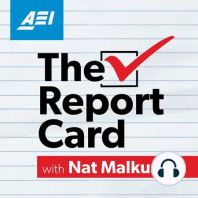45 min listen

Should college students be on campus or remote?
Should college students be on campus or remote?
ratings:
Length:
37 minutes
Released:
Dec 3, 2020
Format:
Podcast episode
Description
As college students around the country wrap up a tumultuous semester, debates about whether colleges should be in-person or remote rage on. About a month ago, https://www.aei.org/profile/nathaniel-n-malkus/ (Nat Malkus) hosted an https://www.aei.org/events/should-college-students-be-back-on-campus/ (AEI web event )centered on this issue. Panelists included https://chrismarsicano.com/ (Christopher Marsicano), assistant professor at Davidson College; https://theuia.org/team/bridget-burns (Bridget Burns) of the University Innovation Alliance; https://www.shu.edu/profiles/robertkelchen.cfm (Robert Kelchen) of Seton Hall University; and https://www.wssu.edu/profiles/robinsonel/index.html (Elwood Robinson) of Winston-Salem State University. You can catch the panel discussion on this episode of The Report Card or watch the web event in its entirety at https://www.aei.org/events/should-college-students-be-back-on-campus/ (AEI.org).
Released:
Dec 3, 2020
Format:
Podcast episode
Titles in the series (100)
Free College in New York with Elsa Magee and Christopher Barto by The Report Card with Nat Malkus